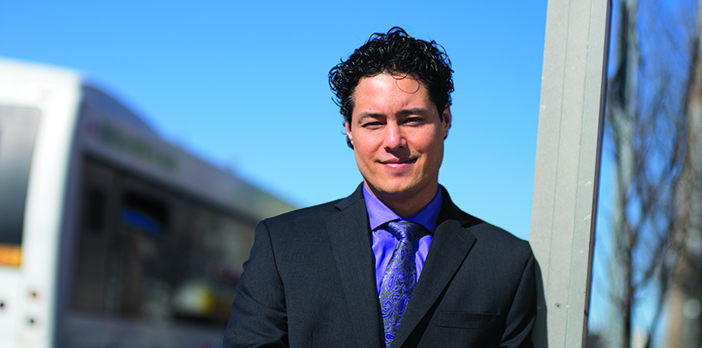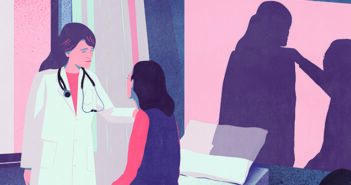Philip Chan is getting the word out about PrEP.
Pre-exposure prophylaxis (PrEP) is a daily pill that prevents HIV infection and transmission with up to 99 percent effectiveness. Tens of millions of people who are at high risk for contracting the virus that causes AIDS would benefit; yet worldwide only about 200,000 people are taking the preventive antiretrovirals.
Infectious diseases physician Philip Chan, MD, MS, RES’09 F’11 treats patients with HIV and prescribes PrEP at The Miriam Hospital Immunology Center, where he’s the director of HIV/STD Testing and Prevention Services. But more and more, he’s embracing his role as communicator and educator, bringing the message of PrEP to the community and his colleagues.
“PrEP was approved by the FDA in July 2012,” says Chan, who’s also an assistant professor of medicine at the Warren Alpert Medical School. “But whether it be primary care doctors or patients, a lot of people haven’t heard about it.”
Chan spreads the word at a myriad of venues. He talks to individual patients. He helps run the Brown University AIDS Program, which trains providers, community organizations, and laypeople. He’s got undergraduate, medical, and other graduate students in the clinic. He shows up at LGBTQ events, including Pride and Trans Day of Remembrance. He sits on the boards of and collaborates with local health and outreach organizations. And he works part time for the state Department of Health as the consultant medical director for the Center for HIV, Hepatitis, STDs, and TB Epidemiology.
Community engagement has been central to Chan’s practice since he arrived in Rhode Island for his internal medicine residency in 2006, and one of the reasons he stayed. “To really make a difference in your community, you really have to be part of the community,” the Concord, NH, native says.
“Through fellowship and through residency, I’d started to make these connections.” By then he’d also grown family roots in the Ocean State: his wife, Juliette, is a Rhode Islander, and they live near her parents, in Lincoln, with their kids Aliza, 10, and Asher, 6.
Chan always wanted to follow in his doctor father’s footsteps. At the University of Vermont he earned degrees in microbiology and molecular genetics as well as medicine. But he was equally attracted to the public health aspect of HIV. “A lot of different social determinants of health intersect … things like homelessness and poverty, a lot of other comorbid diseases—substance abuse, mental health,” he says. “You can really treat the whole person, and not just the disease.”
In Rhode Island, according to research Chan conducted during his infectious diseases fellowship, gay and bisexual men account for about 70 percent of new HIV diagnoses. PrEP “really has the potential to disrupt that transmission, and really address HIV, especially among gay and bisexual men,” Chan says.
He posits that because the people most at risk are young and otherwise healthy, they’re not engaging with the health care system, so they’re less likely to learn about PrEP. But even if they do go in for a checkup, their primary care physician may not know about it, or may be reluctant to talk about sexual health. Many who are taking PrEP are proactive about their health, he says.
“We do worry that we’re not reaching the people that need it most, people who may not remember to take medicine every day, due to a multitude of reasons, whether it be mental health or substance abuse,” Chan says. “Given that those intersect with HIV risk, those are really the people that we want to get this out to.” New formulations of PrEP, including implants and long-acting injectables, are in the works.
Critics of PrEP note that it doesn’t prevent other STDs, and it could encourage risky behavior like not using condoms if people aren’t worried about HIV. “There is evidence starting to point to that,” Chan says. And rates of syphilis, chlamydia, and gonorrhea seem to be on the rise. Chan weighs those diseases, many of which are curable, against HIV, which isn’t. He also says observed increases may be due to more and better testing, which “would actually be a success.”
Rhode Island, with its small size and compact health care and research community, is the perfect place to address challenges and figure out what works, Chan says. “We have some very strong collaborations across the country,” he says. “We’re trying to set up some models here [to address HIV and STDs]that we can replicate elsewhere.”




